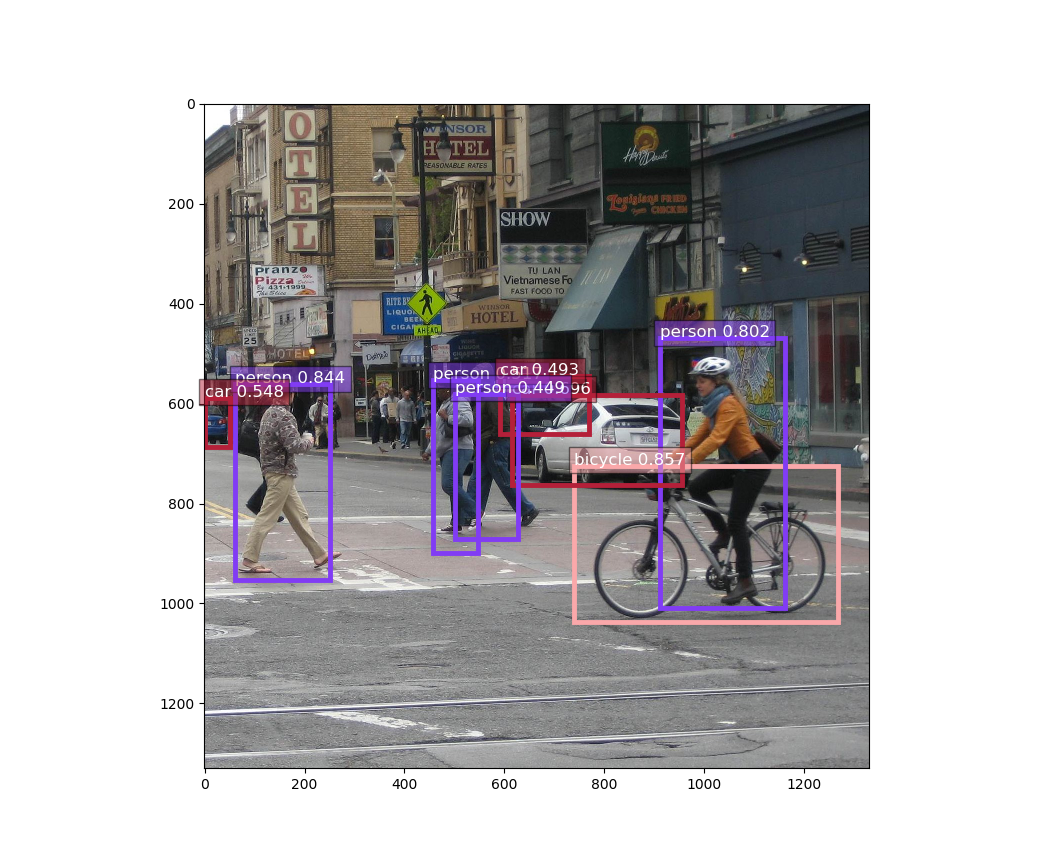- Training different backbone from scratch
- Get new network weights by training on imagenet directly or transfer learning
- Loss function
- Adding --num_layers in train.py for choosing different network
- lr=0.001, steps=(90, 180), data-shape=416. However, adding the first 80 epoch, in fact the steps = (90 + 80, 180 + 80)
- first: just runing in 80 epoch then stop because of batch-size=30!
python train-416.py --gpus 0,1 --network resnet50_yolo --data-shape 416 --pretrained model/resnet-50 \
--epoch 0 --log train_416.log --min-random-shape 320 --batch-size 30
- second: continuing to train based on the 80-th weight in the first, meanwhile tuning batch-size to 28!
python train-416.py --gpus 0,1 --network resnet50_yolo --data-shape 416 --pretrained model/yolo2_resnet50_416 \
--epoch 80 --log train_416_80.log --min-random-shape 320 --batch-size 28
- 2018/06/15: Epoch[236] Validation-mAP=0.759613
- 2018/06/14: Epoch[174] Validation-mAP=0.759229
- 2018/06/14: Epoch[126] Validation-mAP=0.757837
- 2018/06/14: Epoch[105] Validation-mAP=0.757725
- 2018/06/14: Epoch[104] Validation-mAP=0.757814
- 74 mAP by original repo (https://github.com/zhreshold/mxnet-yolo)
- 76.8 mAP at (416 x 416) by original paper.
- tuning random-shape-epoch from 10 to 1, other almost same with original repo.
- Command:
python train-416.py --network resnet50_yolo --batch-size 28 --pretrained model/resnet-50 \
--epoch 0 --gpus 0,1 --begin-epoch 0 --end-epoch 240 --data-shape 416 \
--random-shape-epoch 1 --min-random-shape 320 --max-random-shape 608 \
--lr 0.001 --lr-steps 90,180 --lr-factor 0.1 --log train-exp2.log \
--num-class 20 --num-example 16551 --nms 0.45 --overlap 0.5
- 2018/06/15: Epoch[236] Validation-mAP=0.707528
- lr-steps 180,360
- Command:
python train-416.py --network resnet50_yolo --batch-size 28 --pretrained model/resnet-50 \
--epoch 0 --gpus 0,1 --begin-epoch 0 --end-epoch 540 --data-shape 416 \
--random-shape-epoch 10 --min-random-shape 320 --max-random-shape 608 \
--lr 0.001 --lr-steps 180,360 --lr-factor 0.1 --log train-exp3.log \
--num-class 20 --num-example 16551 --nms 0.45 --overlap 0.5
- 2018/06/18: Epoch[256] Validation-mAP=0.758914
- lr-factor=0.5,lr-steps=[90,180,270,360,450],lr=[0.001,0.0005,0.00025,0.000125,0.0000625,0.00003125]
- Command:
python train-416.py --network resnet50_yolo --batch-size 28 --pretrained model/resnet-50 \
--epoch 0 --gpus 0,1 --begin-epoch 0 --end-epoch 540 --data-shape 416 \
--random-shape-epoch 10 --min-random-shape 320 --max-random-shape 608 \
--lr 0.001 --lr-steps 90,180,270,360,450 --lr-factor 0.5 --log train-exp4.log \
--num-class 20 --num-example 16551 --nms 0.45 --overlap 0.5
python train-416.py --network resnet50_yolo --batch-size 28 --pretrained model/resnet-50 \
--epoch 0 --gpus 0,1 --begin-epoch 0 --end-epoch 540 --data-shape 416 \
--random-shape-epoch 10 --min-random-shape 320 --max-random-shape 608 \
--lr 0.001 --lr-steps 90,180,270,360,450 --lr-factor 0.5 --log train-exp4.log \
--num-class 20 --num-example 16551 --nms 0.45 --overlap 0.5 --resume 288
- 2018/06/21: Epoch[477] Validation-mAP=0.759190
- 2018/06/20: Epoch[408] Validation-mAP=0.759149
- 2018/06/19: Epoch[276] Validation-mAP=0.757242
- 2018/06/19: Epoch[233] Validation-mAP=0.755262
- lr-factor=0.1,lr-steps=[90,180,270,360,450],lr=[0.001,0.0001,0.00001,0.000001,0.0000001,0.00000001]
- Command:
python train-416.py --network resnet50_yolo --batch-size 28 --pretrained model/resnet-50 \
--epoch 0 --gpus 0,1 --begin-epoch 0 --end-epoch 540 --data-shape 416 \
--random-shape-epoch 10 --min-random-shape 320 --max-random-shape 608 \
--lr 0.001 --lr-steps 90,180,270,360,450 --lr-factor 0.1 --log train-exp5.log
- 2018/06/22:
- lr-factor=0.1,lr-steps=[90,180],lr=[0.001,0.0001,0.00001]
- Command:
python train-416-resnet152.py --network resnet152_yolo --batch-size 28 --pretrained scratch\
--epoch 0 --gpus 0,1 --begin-epoch 0 --end-epoch 540 --data-shape 416 \
--random-shape-epoch 10 --min-random-shape 320 --max-random-shape 608 \
--lr 0.001 --lr-steps 90,180 --lr-factor 0.1 --log train-exp6.log
- 2018/06/22:
- data-shape != 416
- The results are not good becouse the pretrained models are trained for data-shape 416?
- 71 mAP by original repo (https://github.com/zhreshold/mxnet-yolo)
added the following operators:
- yolo_output.* to src/operator/contrib
- create file: mxnet-yolov2/symbol/symbol_resnet152_yolo.py
- get weights file for resnet152
- change num_layers (from 50 to 152) in symbol_resnet152_yolo.py:
def get_symbol(num_classes=20, nms_thresh=0.5, force_nms=False, **kwargs):
#body = resnet.get_symbol(num_classes, 50, '3,224,224')
body = resnet.get_symbol(num_classes, 152, '3,224,224')
- using resnet152_yolo as --network in train.py
Re-implementation of original yolo-v2 which is based on darknet.
The arXiv paper is available here.
- Build from source, this is required because this example is not merged, some custom operators are not presented in official MXNet. Instructions
- Install required packages:
cv2,matplotlib
- Download the pretrained model(darknet as backbone), or this model(resnet50 as backbone) and extract to
model/directory. - Run
# cd /path/to/mxnet-yolo
python demo.py --cpu
# available options
python demo.py -h
- Grab a pretrained model, e.g.
darknet19 - (optional) Grab a pretrained resnet50 model,
resnet-50-0000.params,resnet-50-symbol.json, this will produce slightly better mAP thandarknetin my experiments. - Download PASCAL VOC dataset.
cd /path/to/where_you_store_datasets/
wget http://host.robots.ox.ac.uk/pascal/VOC/voc2012/VOCtrainval_11-May-2012.tar
wget http://host.robots.ox.ac.uk/pascal/VOC/voc2007/VOCtrainval_06-Nov-2007.tar
wget http://host.robots.ox.ac.uk/pascal/VOC/voc2007/VOCtest_06-Nov-2007.tar
# Extract the data.
tar -xvf VOCtrainval_11-May-2012.tar
tar -xvf VOCtrainval_06-Nov-2007.tar
tar -xvf VOCtest_06-Nov-2007.tar
ln -s /path/to/VOCdevkit /path/to/mxnet-yolo/data/VOCdevkit
- Create packed binary file for faster training
# cd /path/to/mxnet-ssd
bash tools/prepare_pascal.sh
# or if you are using windows
python tools/prepare_dataset.py --dataset pascal --year 2007,2012 --set trainval --target ./data/train.lst
python tools/prepare_dataset.py --dataset pascal --year 2007 --set test --target ./data/val.lst --shuffle False
- Start training
python train.py --gpus 0,1,2,3 --epoch 0
# choose different networks, such as resnet50_yolo
python train.py --gpus 0,1,2,3 --network resnet50_yolo --data-shape 416 --pretrained model/resnet-50 --epoch 0
# choose different networks, such as resnet152_yolo
python train.py --gpus 0,1,2,3 --network resnet152_yolo --data-shape 416 --pretrained model/resnet-50 --epoch 0
# see advanced arguments for training
python train.py -h
